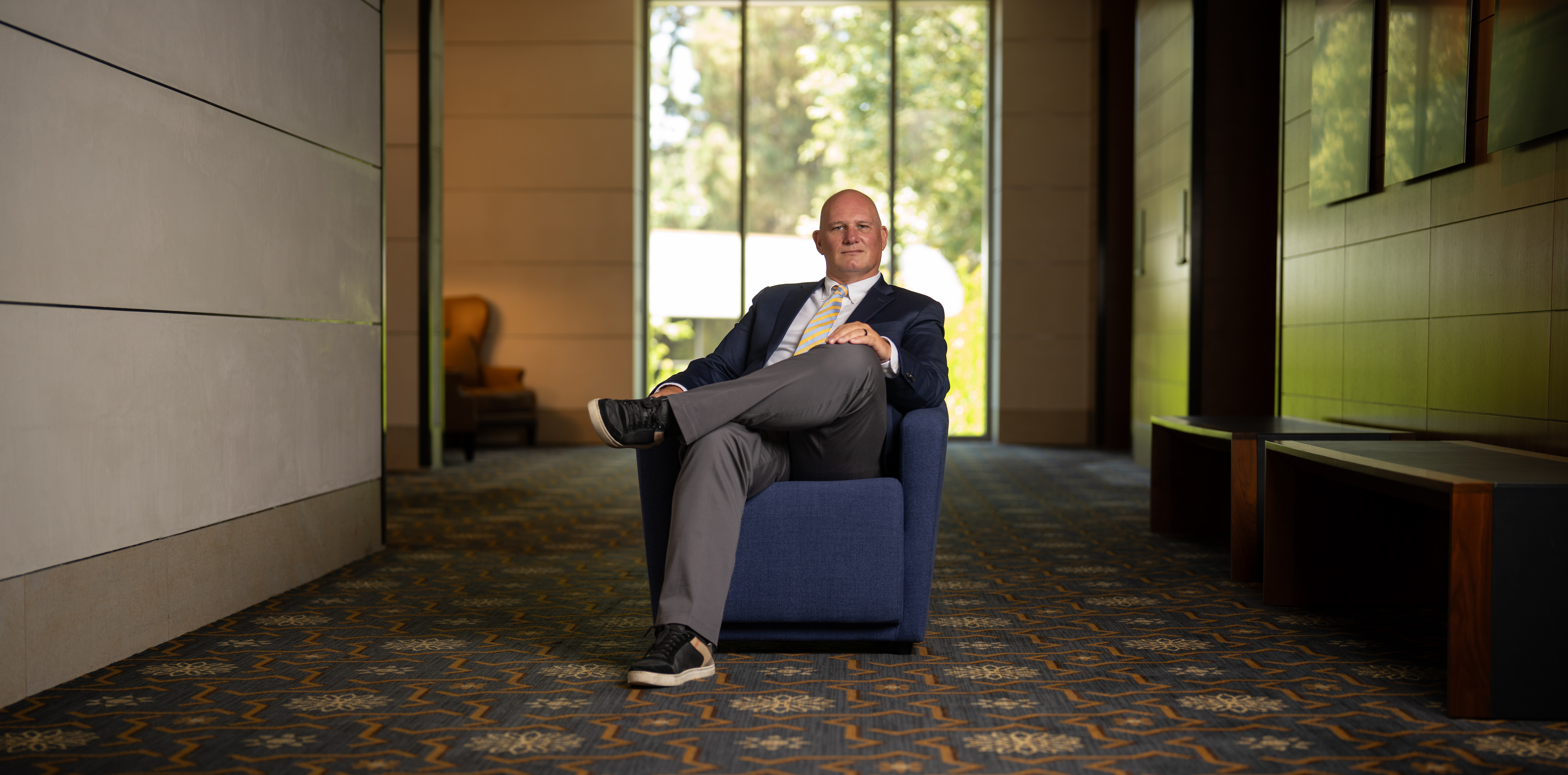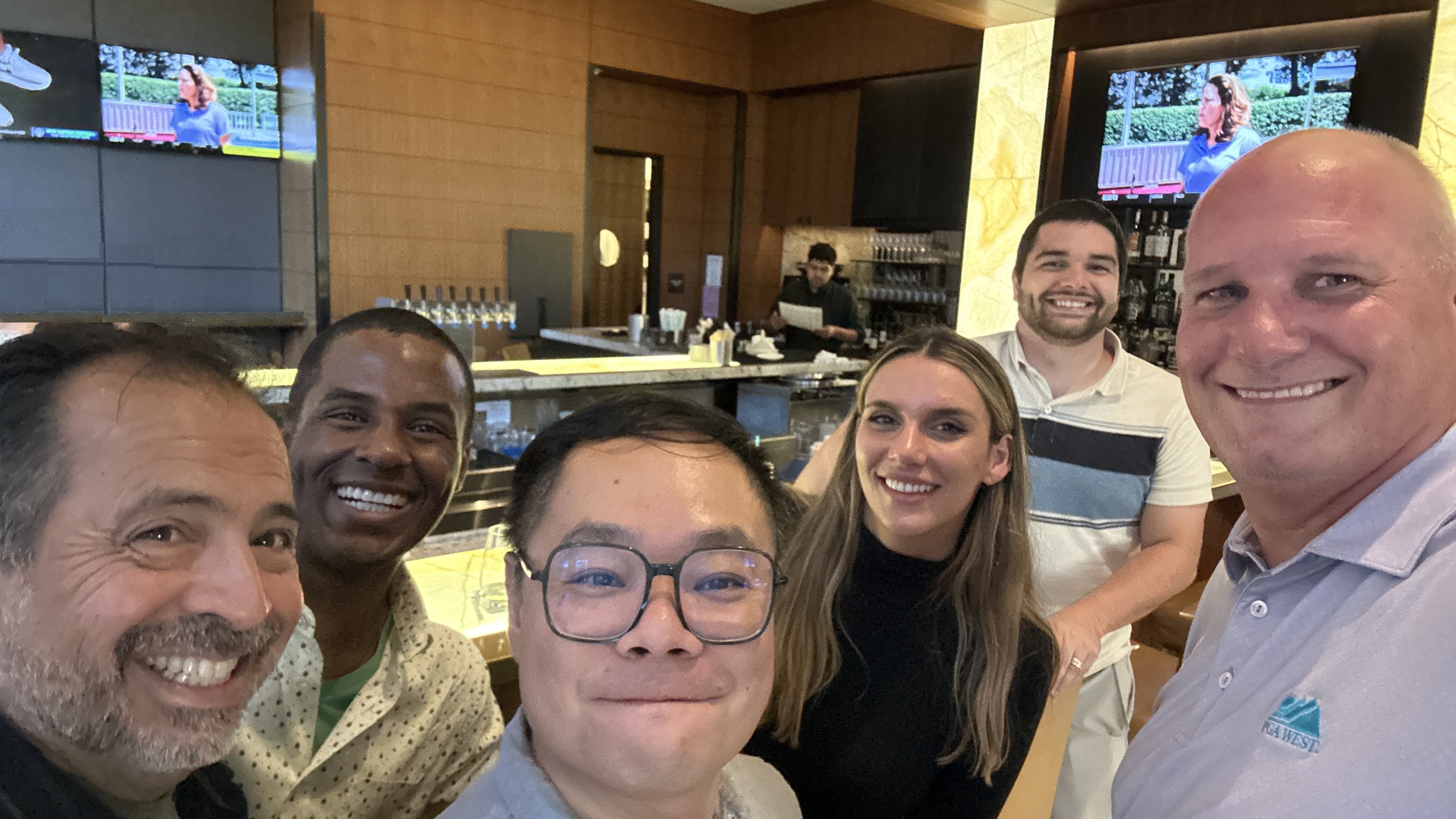
Captain’s log, Stardate -299678.96 (2024_09_05, 8:00 a.m. PST). Joe Way steps out of a time warp to reflect on the past year when he joined the Information Technology Services leadership team as the executive director of Digital Spaces at the University of California, Los Angeles (UCLA).
First, Joe, congratulations on your first anniversary at UCLA, my friend. Now, we’re all curious to know how it is going.
Q: What were some of the biggest surprises in your first year?
Thank you, Cindy, for inviting me back to share my experience over the past year at UCLA. It's crazy to think that it has already been twelve months. If someone told me it's been twelve days, twelve weeks, twelve months, or twelve years, I would believe them all. It's a paradox of feeling like I've done very little while at the same time accomplishing so much. I will say it's been nothing like I thought it would be and in a very good way. As the executive director of digital spaces, I serve on the DCIO leadership team. Basically, I'm a suit now. I spend my time focusing on strategy and executive-level collaboration, rather than "stuff." It's been a learning curve that I wish other higher ed institutions would adopt. I would guess that we are the only elite large R1 institution that has "the AV guy" with a seat at this level. This shows in a tangible way the importance that UCLA places on the service we provide and how integral AV is to effective teaching and learning. The biggest surprise—and I wouldn't necessarily say it is a surprise as much as a lesson learned—is how much more strategic thinking goes into project implementation. What others call "bureaucracy," in truth, is due diligence, ensuring that the millions of dollars and tens of thousands of labor hours are being spent effectively and for the good of our campus community. And at UCLA, it is done in a true spirit of collaboration, with the institution's full support from the very top all the way down the organization. It's a very special place to be and time to be here as we continue our Digital Campus Roadmap initiative. UCLA is the #1 public institution in the United States, and it's easy to see and feel why.

Q: What are some of your most significant accomplishments?
This is where I feel like I've done little. Just two weeks ago, I finally got my senior leadership team in place. The first year was about vision casting and team building. We use the saying here: "Move slow to move fast." While my instinct is to want to run full-steam into planning the technology upgrade—because it is needed; there is a lot of technical debt needing to be repaid—we are being intentional in getting all the right people and processes in place so that when it is time to pull the trigger, we're ready to go straight at the goal. Again, it goes back to the importance of trusting the process to get it right the first time. It's a puzzle, and first, we have you build out the sides. I will say confidently that I have the single best leadership team in all higher education, if not the AV industry itself. And the teams they are putting together include the very best talent out there. I'm excited to see how the puzzle fills out and then incredible accomplishments ahead. Our Digital Campus Roadmap is unique, including fifteen initiatives from LMS to financial systems to network unification to classroom modernization and others, but we only have one shot at it. For me, when coming into this role, I wanted to be intentional, not to be in a silo, to work across the organization and leverage the resources and knowledge of my peers. One way of doing this is that before we start our upgrade project, we will create an audiovisual governance model and project charter to frame the goal. This will include engaging the ePMO, hiring a professional program manager consultant (like a Deloitte, KPMG, EY, Slalom, or others still TBD), and running through a formal RFP process in all aspects. I joke that we're going to actually act like the IT department that AV people keep saying we are. But we're going to actually do it, leverage those best practices, and not just be a lone group that happens to just fall under the IT department.
On top of that, I was very proud to have hosted a HETMA roadshow, the inaugural Sustainability in AV global conference, and a Times Higher Education global summit here on campus. Those were huge to pull off and set us up well for establishing a mentality of leadership. We will be a major influence and trailblazer in the AV and higher ed industries. I wanted the team here to feel what that was like. Hosting those events helped the team recognize it and have the mindset of the greatness to come.
Q: What's it like working at a public versus a private institution?
This was one of my biggest "ah ha" moments. In the past, I was continually told by colleagues who work at public institutions how lucky I was to be at a "rich private school." So, to be honest, I was a little worried about the red tape I'd encounter moving to a public institution. Yet, it's actually the exact opposite. Public institutions run of policy and process. Do you want something done? Look up the policy, follow the process, and it happens. At a private institution, decisions were often made politically or based on how someone felt that day. Don't get me wrong, I loved my time at my two former private schools, but there is a difference. At public schools, money that is awarded for a project is earmarked for that project. At privates, finances could be redistributed to other priorities. Also, I notice how engaged staff are from the top down here. You feel people are proud to work for a state school and be part of a larger UC system. You feel the impact. That said, at a private school, there was more flexibility to move and pivot fast because things weren't tied to larger public policies. All that to say, both are great; just know how the system works where you are. Oh, but I kind of wish I had discovered the greatness of a state pension about twenty years ago!
Q: How are you organizing the team?
As I noted earlier, the team is coming together. The positive part of being involved in a reorganization early on was the ability to design the organization from scratch. This allowed me to do a few unique things. Because my portfolio is wide, covering general-use classrooms, executive conference rooms, live events spaces, digital signage, live streaming, and production, and spread across multiple campuses, I wanted to be effective across the whole scope. First, I created five distinct verticals, two support verticals, one for academics and administration and one for live events and production needs, two functional verticals, one for design, architecture, and project management, and one for operations, finance, and signage/comms, and a product manager who reports directly to me. In fact, every one of my peers has some version of a product manager in their org who all work as a community of practice to share and learn what each department is doing and ensure we have the right voice while leveraging the resources available. Taking the design, architecture, and project management out of the support areas allows them to create a single enterprise platform from which everything else can be built upon. I didn't want the classrooms doing their own thing and the event spaces doing their own thing. I had the unique opportunity to work as an "enterprise solution" with management and central oversite. Likewise, I took all services that worked across the department, like finance, security, facilities, signage, and logistics, and placed them under one operations vertical. Again, this allows for oversight and consistency across the entire organization. Last, I added a couple of unique roles to the organization, including an AV Sales Manager as a customer liaison for the services that we sell in our events spaces. I have an AV/IT Training Coordinator to work with the user adoption and staff training and be a liaison to other departments like the teaching and learning center to make sure what we are designing and installing is aligned with current pedagogical practices. Basically, I created our own true integration company that includes sales, design, engineering, and support.
[Throwback Thursday: Joe Way’s First Day of School, Fall 2023 at UCLA]
Q: What is in store for year two?
Year two is going to be an interesting one. I still believe we'll be in the "move slow" part of the plan, yet UCLA is serving as the Olympic Village for the LA28 Olympic Games, so we can only move so slowly. My hope is that we complete recruitment by the end of the calendar year, onboard our program manager/consulting firm by the end of Q1 2025, and then be in the proof-of-concept phase of the RPF for the technology solutions that we'll be looking to install in summer of 2026. As I keep saying, when people ask me what technology we'll be installing, my response is that I don't know because we haven't invented it yet. Again, we're in this unique situation: while there are two decades of technical debt to repay, I don't want to catch up; I want to place us five to years ahead of everyone in higher education—and really AV itself. This means virtual classrooms, digital twinning, cloud services, API integration, and creating a single enterprise platform that's never been done before. So, by the end of year two, I hope that direction will start to take form. This is a great challenge ahead, but it's fun, and it's going to be industry-changing because of the foundation my leadership put in place. We cannot help but be successful.







